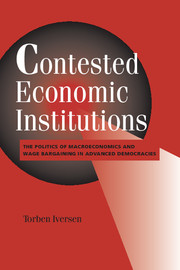2 - An Institutional Model of Economic Performance
from PART I - The Real Effects Of Monetary Policies
Summary
Since the breakdown of the Keynesian-neoclassical synthesis in the 1970s, the study of the political economy of economic performance has branched into a number of competing approaches. At the most abstract level, the controversy centers around the effect of money and monetary policies on unemployment (Mankiw 1990). Although Keynesian economists have always maintained that money is important for real outcomes, new classical economists, assuming that people have rational expectations, insist that money and monetary policy are “neutral” in the sense that they cannot permanently affect real variables like income or unemployment. Recently, more and more economists are coming to the recognition that rational expectations are not inconsistent with monetary policies having lasting real effects. Still largely ignored by political scientists, this controversy is essential for understanding the political-institutional preconditions for full employment and low inflation.
The rational expectations revolution basically eliminated political economy models that were based on the existence of an exploitable Phillips curve tradeoff (most notably Hibbs's 1977 partisan politics model), and analyses that implied real effects of monetary policies largely vanished from the literature. Instead, the study of the causes of unemployment and inflation turned to the role of unions and incomes policies. With the point of departure in Schmitter's revival of the concept of corporatism (1974), and gradually incorporating insights from game theory and especially the work of Olson (1965, 1982), this literature underscored the importance of collective wage bargaining and union government relations for explaining inflation and unemployment performance (see, for example, Przeworski and Wallerstein 1982; Lange 1984; Cameron 1984; Crouch 1985; Calmfors and Driffill 1988; Alvarez, Garrett, and Lange 1991).
The neo-corporatist literature helped to pinpoint institutional and political mechanisms that could affect real outcomes such as unemployment. The inattention to the rational expectations and central bank independence literature, however, still poses a problem. In particular, it seems inconceivable that large and powerful unions would not let their real-wage behavior be influenced by the anticipated effects of such behavior on monetary policies. And if expectations are not allowed to change with changes in monetary policies, then expectations are no longer rational, as explained by Lucas (1976).
- Type
- Chapter
- Information
- Contested Economic Institutions , pp. 17 - 46Publisher: Cambridge University PressPrint publication year: 1999



